|
|
|
Sort Order |
|
|
|
Items / Page
|
|
|
|
|
|
|
| Srl | Item |
| 1 |
ID:
111847
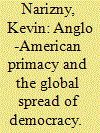

|
|
|
|
|
| Publication |
2012.
|
| Summary/Abstract |
For the past three centuries, Great Britain and the United States have stood in succession at the apex of the international hierarchy of power. They have been on the winning side of every systemic conflict in this period, from the War of the Spanish Succession to the Cold War. As a result, they have been able to influence the political and economic development of states around the world. In many of their colonies, conquests, and clients, they have propagated ideals and institutions conducive to democratization. At the same time, they have defeated numerous rivals whose success would have had ruinous consequences for democracy. The global spread of democracy, therefore, has been endogenous to the game of great power politics.
|
|
|
|
|
|
|
|
|
|
|
|
|
|
|
|
| 2 |
ID:
114498
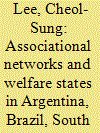

|
|
|
|
|
| Publication |
2012.
|
| Summary/Abstract |
This article investigates the structures of civic networks and their roles in steering the political choices of party and union elites regarding the retrenchment or expansion of welfare states in four recently democratized developing countries. Utilizing coaffiliation networks built upon two waves of World Values Surveys and evidence from comparative case studies for Argentina, Brazil, South Korea, and Taiwan, the study develops two explanatory factors that account for variations in welfare politics: cohesiveness and embeddedness. In Argentina and, to a lesser degree, in Taiwan, party and union leaders' cohesive relationships, being disarticulated from the informal civic sphere, allowed them to conduct elite-driven social policy reforms from above, by launching radical neoliberal reforms (Argentina) or by developing a generous transfer-centered welfare state (Taiwan). In Brazil and South Korea, however, party and union leaders' durable solidarity embedded in wider civic communities enabled them to resist the retrenchment of welfare states (Brazil) or implement universal social policies (South Korea) based on bottom-up mobilization of welfare demands. This article demonstrates that elites in the formal sector make markedly different political choices when confronting economic crisis and democratic competition depending upon their organizational connections in formal and informal civic networks.
|
|
|
|
|
|
|
|
|
|
|
|
|
|
|
|
| 3 |
ID:
114497
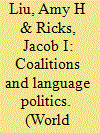

|
|
|
|
|
| Publication |
2012.
|
| Summary/Abstract |
Why is it that some governments recognize only one language while others espouse multilingualism? Related, why are some governments able to shift language policies, and if there is a shift, what explains the direction? In this article, the authors argue that these choices are the product of coalitional constraints facing the government during critical junctures in history. During times of political change in the state-building process, the effective threat of an alternate linguistic group determines the emergent language policy. If the threat is low, the government moves toward monolingual policies. As the threat increases, however, the government is forced to co-opt the alternate linguistic group by shifting the policy toward a greater degree of multilingualism. The authors test this argument by examining the language policies for government services and the education system in three Southeast Asian countries (Singapore, Malaysia, and Thailand).
|
|
|
|
|
|
|
|
|
|
|
|
|
|
|
|
| 4 |
ID:
111843


|
|
|
|
|
| Publication |
2012.
|
| Summary/Abstract |
One of the defining features of modern states is their incorporation of notions of political and social community based on shared language, history, and myths. However, large numbers of citizens in modern states have come to believe their national communities are under threat from several modern forces, including immigration. Using the European Social Survey (2002-9), this article explores the extent to which perceived threats posed by large-scale immigration undermine national political communities by reducing trust in national politicians and political institutions. The findings indicate that even after controlling for other predictors of trust in the political system, concerns about the effect of immigration on the national community have an impact on trust in politics. Moreover, having a lengthy postwar history with mass immigration mediates this effect, while the potentially mobilizing effects of far-right parties on the relationship between concern about immigration and political distrust are somewhat limited.
|
|
|
|
|
|
|
|
|
|
|
|
|
|
|
|
| 5 |
ID:
111846


|
|
|
|
|
| Publication |
2012.
|
| Summary/Abstract |
Does democratization increase commitment to multilateral security? In this article, the author argues that democratic transitions increase the incentives of states to cooperate in multilateral security and that this is observable in the rate at which new democracies ratify international treaties of arms control, nuclear nonproliferation, and disarmament. New democrats, she asserts, seek a positive international reputation as an insurance mechanism against future regime reversals. By becoming "good citizens" of the global system, newly elected democratic leaders seek to expose potential conspirators to the possibility of diplomatic and economic sanctions if they were to attempt to reverse the transition. First, using original data on the ratification rates of 201 states for twenty major arms control, nonproliferation, and disarmament treaties, the present study shows conclusively that new democracies outpace older democracies and all autocracies in committing to multilateral security. Second, the study empirically tests whether the swift ratification of security treaties works as a consolidation strategy and finds that, indeed, it does. That is, new democracies that commit to nonproliferation and arms control treaties are less likely to experience a regime reversal.
|
|
|
|
|
|
|
|
|
|
|
|
|
|
|
|
| 6 |
ID:
114496


|
|
|
|
|
| Publication |
2012.
|
| Summary/Abstract |
Member states of the gatt/wto have linked some issue-areas outside trade to the institution and did so with varying depths. At the same time they have chosen not to link other issue-areas. What accounts for this variation? The author argues that states establish a legalized linkage between the gatt/wto and an issue-area outside it when they are uncertain about the possibilities of disguised protectionism. Such uncertainty exists under two conditions: when diversity in regulations in an issue-area across states generates a large adverse impact on trade (negative externalities) but that diversity can be justified at the international level for (1) having an independent objective apart from hampering trade and (2) when there are few alternative policies to achieve that objective (legitimacy). States establish a highly legalized linkage in these situations to reduce the uncertainty and minimize disguised protectionism. By contrast, when regulatory diversity exhibits low legitimacy, states establish only a weakly legalized linkage. In the absence of meaningful externalities, they do not establish any linkages. The author evaluates this argument in two ways. He provides an overview of eleven issue-areas about which there have been some debates or conflicts about linkages to the gatt/wto. In addition, he carries out in-depth case studies of three issue-areas-labor standards, environmental standards, and health safety standards. The findings of this article contribute to a better understanding of international institutions and cooperation as well as of the evolution of the multilateral trade institution.
|
|
|
|
|
|
|
|
|
|
|
|
|
|
|
|
| 7 |
ID:
114495
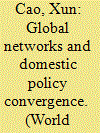

|
|
|
|
|
| Publication |
2012.
|
| Summary/Abstract |
National economies are embedded in complex networks such as trade, capital flows, and intergovernmental organizations (igos). These globalization forces impose differential impacts on national economies depending on a country's network positions. This article addresses the policy convergence-divergence debate by focusing on how networks at the international level affect domestic fiscal, monetary, and regulatory policies. The author presents two hypotheses: first, similarity in network positions induces convergence in domestic economic policies as a result of peer competitive pressure. Second, proximity in network positions facilitates policy learning and emulation, which result in policy convergence. The empirical analysis applies a latent-space model for relational/dyadic data and indicates that position similarity in the network of exports induces convergence in fiscal and regulatory policies; position similarity in the network of transnational portfolio investments induces convergence in fiscal policies; and position proximity in igo networks is consistently associated with policy convergence in fiscal, monetary, and regulatory policies.
|
|
|
|
|
|
|
|
|
|
|
|
|
|
|
|
| 8 |
ID:
114499
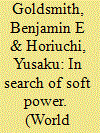

|
|
|
|
|
| Publication |
2012.
|
| Summary/Abstract |
Does "soft power" matter in international relations? Specifically, when the United States seeks cooperation from countries around the world, do the views of their publics about US foreign policy affect the actual foreign policy behavior of these countries? The authors examine this question using multinational surveys covering fifty-eight countries, combined with information about their foreign policy decisions in 2003, a critical year for the US. They draw their basic conceptual framework from Joseph Nye, who uses various indicators of opinion about the US to assess US soft power. But the authors argue that his theory lacks the specificity needed for falsifiable testing. They refine it by focusing on foreign public opinion about US foreign policy, an underemphasized element of Nye's approach. Their regression analysis shows that foreign public opinion has a significant and large effect on troop commitments to the war in Iraq, even after controlling for various hard power factors. It also has significant, albeit small, effects on policies toward the International Criminal Court and on voting decisions in the UN General Assembly. These results support the authors' refined theoretical argument about soft power: public opinion about US foreign policy in foreign countries does affect their policies toward the US, but this effect is conditional on the salience of an issue for mass publics.
|
|
|
|
|
|
|
|
|
|
|
|
|
|
|
|
| 9 |
ID:
111845
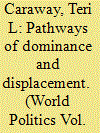

|
|
|
|
|
| Publication |
2012.
|
| Summary/Abstract |
Legacy unions-formerly state-backed unions that survived democratic transitions-are one of the most persistent legacies of authoritarian rule. While usually successful in maintaining their preeminent position, legacy unions have in some cases been overtaken by competing unions. Deploying a set of paired comparisons of legacy unions that entered the transition with similar legacies but experienced different fates-Indonesia with South Korea and Poland with Russia-this article examines why some legacy unions continued to dominate (Indonesia and Russia) and others did not (South Korea and Poland). The author identifies four pathways of change: endurance (Indonesia), attrition (South Korea), hegemony (Russia), and rupture (Poland). Several features of the transition context propelled legacy unions down distinct pathways of change-the widespread mobilization of workers outside of state-sponsored unions early in the transition, partisan links, and the structure of union competition.
|
|
|
|
|
|
|
|
|
|
|
|
|
|
|
|
| 10 |
ID:
111844


|
|
|
|
|
| Publication |
2012.
|
| Summary/Abstract |
How do property rights become secure? How does rule of law take hold in an economy? The author uses an original survey of 516 firms in Russia and Ukraine, as well as interview-based case studies, to reexamine these fundamental issues of political economy. Most states in the developing world lack the requisite time horizons and institutional capacity to make the credible commitments emphasized in the literature. In this context, the author argues that firms can enforce their property rights without resort to mafias by forming alliances with stakeholders such as foreign actors, community residents, and labor. These stakeholders can impose costs on the potential aggressors through diverse political strategies, allowing firms to defend their property rights not only from private predators but also from the state. The article evaluates this "bottom-up" theory of secure property rights against existing state-based theorizing.
|
|
|
|
|
|
|
|
|
|
|
|
|
|
|
|
|
|
|
|
|